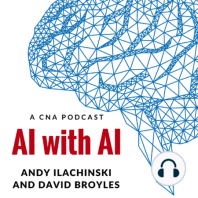40 min listen
Crime & Publishment
FromAI with AI: Artificial Intelligence with Andy Ilachinski
ratings:
Length:
39 minutes
Released:
Jul 10, 2020
Format:
Podcast episode
Description
It’s a week of huge announcements! But first, in COVID-related AI news, Andy and Dave discuss a review paper in Chaos, Solitons, and Fractals that provides a more international focus on the role of AI and ML in COVID research. CSAIL teams with Ava Robotics to design a robot that maneuver between waypoints and disinfect surfaces of warehouses with UV-C light. C3.ai Digital Transformation Institute awards $5.4M to 26 AI researchers for projects related to COVID-19. In non-COVID news, the Association for Computing Machinery calls for the immediate suspension of facial recognition technologies until more mature and reliable. US lawmakers have introduced a bill that would ban police use of facial recognition, while separate bills seek to increase the AI talent available for the Department of Defense, and work to realign and rewire the JAIC within DoD. Over 2300 researchers sign a petition to Springer Nature to reject a publication from Harrisburg University, which developed facial recognition software to predict whether somebody was going to be a criminal. Meanwhile, researchers from Stanford demonstrate the problem of reproducibility by giving a data set of brain scans to 70 different researcher teams; no two teams chose the same workflow to analyze the data, and the final conclusions showed a sizeable variation. In a similar vein, researchers at Duke University examine the historical record of brain scan research and find poor correlation across experiments. In research, the “best paper” for the Conference on Computer Vision and Pattern Recognition goes to a team from Oxford, who use unsupervised learning methods and symmetry to convert single 2D images into 3D models. Researchers at Uber, the University of Toronto, and MIT use 3D simulated worlds to generate synthetic data for training LiDAR systems on self-driving vehicles. Calum MacKellar makes Cyborg Mind available, a look into the future of cyberneuroethics. And Johns Hopkins prepares for a second seminar on Operationalizing AI in Health. Click here to visit our website and explore the links mentioned in the episode.
Released:
Jul 10, 2020
Format:
Podcast episode
Titles in the series (99)
A Tesseract to Follow: In COVID-related AI news, Purdue University has built a website that tracks global response to social distancing, by pulling live footage and images from over 30,000 cameras in 100 countries. Simon Fong, Nilanjan Dey, and Jyotismita Chaki have... by AI with AI: Artificial Intelligence with Andy Ilachinski
